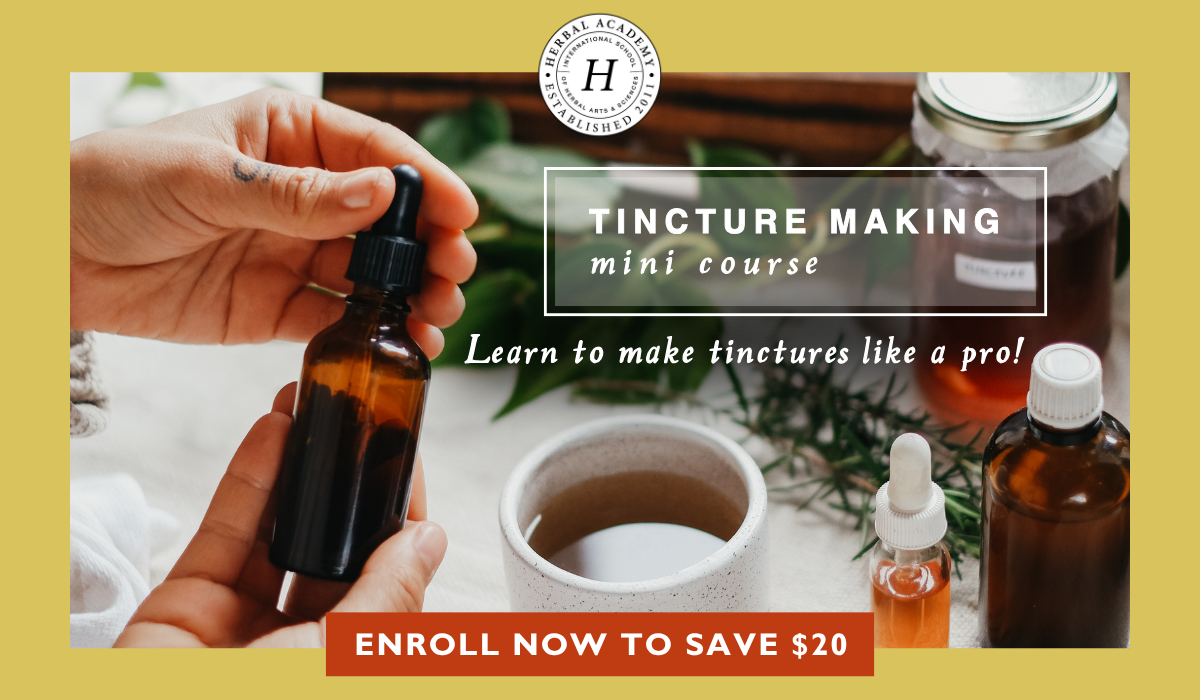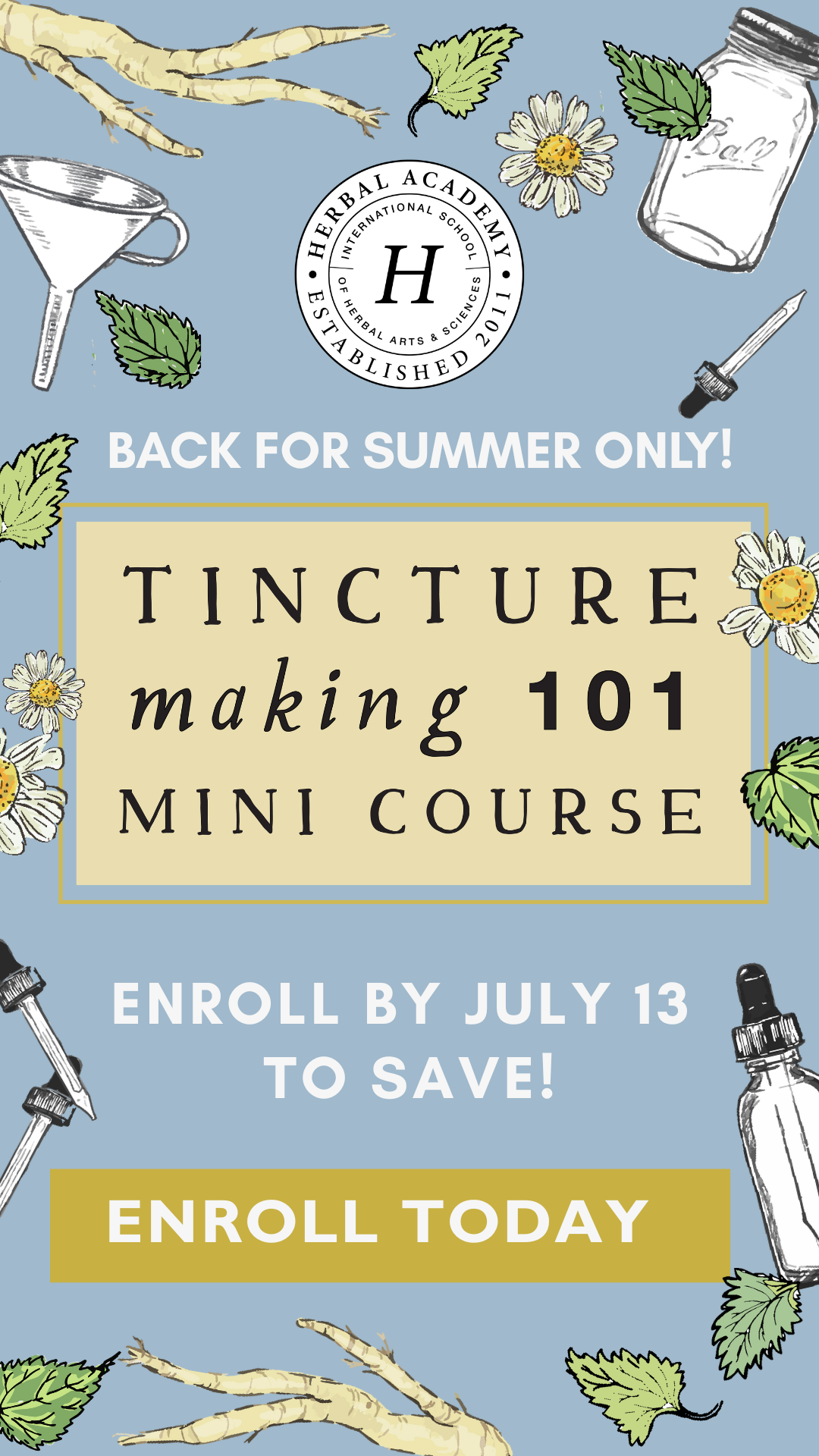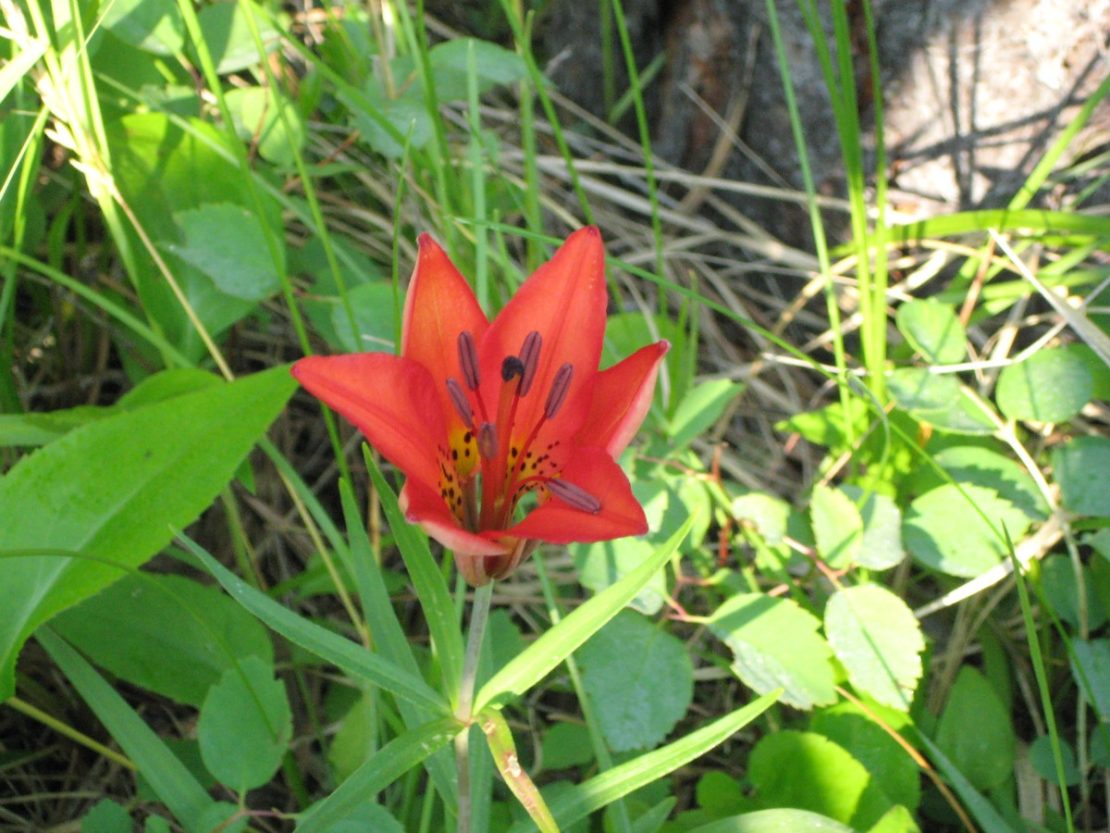
Teacher Feature: Carey Denman
Carey Denman is a community herbalist and associate educator here at the Herbal Academy, and we are excited to share this interview with Carey as a way to introduce another of the wonderful teachers that are hard at work behind the scenes here at the school.
Carey lives with her family on a small acreage in the Black Hills, where she keeps a few chickens and maintains a rambling garden that is a living classroom for her family. She credits her “free-range” childhood and the guidance of her father, the unofficial family naturalist, for sparking her interest in gardening and plants, but her introduction to the vibrant world of herbalism was a happy accident.
Herbal Academy: Please tell us a little about how you came to be an herbalist. What initially drew you to this path? How has your herbal path grown from that?
Carey Denman: I think of myself as an accidental herbalist. My herbal adventure began six years ago when I picked up some calendula seeds on a whim while at the feed store. At the time, I only knew my gardener’s heart admired the ochre-colored flowers pictured on the seed packet. I took those seeds home and poked them into the ground in between the Hubbard squash and the giant zinnias and went about my normal garden routines. In the meantime, the flowers grew with wild abandon, and I admired their sunny contribution to my garden plot.
Around midsummer, the flowers in their prime, I came upon an article in a magazine that pictured a swath of golden blooms. The story detailed the value of these plants, explaining how they could be a boon for troubled skin. At that moment, I experienced a bolt of recognition; I already had these flowers growing in my garden!
This was a particularly momentous discovery because we were in the thick of dealing with my son’s severe—and sometimes-debilitating—eczema. To complicate matters, his intense scratching and the resulting wounds led to frequent staph infections. We were caught in a cycle of using steroids and antibiotics, ping-ponging from one drug to the next.
I’d always felt unsettled about relying so heavily on these drugs, but I felt helpless to do anything else. But when I read about how calendula has been used traditionally as an anti-inflammatory, antiseptic, antibacterial, and a vulnerary to boot, I suddenly saw a sliver of salvation growing in my garden.
When I made my first calendula salve, I felt like an alchemist. I had transformed flowers into a useful application! But my awe didn’t stop there. At that point, I started applying calendula salve to my son’s skin daily. Within days, the wounds in the folds of his arms and the backs of his knees improved, and he looked and felt better than he had in years.
Truly, the experience of seeing this improvement was nothing short of transformative—for both of us. Buoyed by my first herbal success, I started considering other ways to incorporate plants into my family’s life. And I was smitten.
I read every herbal book in my local library and started building an herbal library of my own. Little by little, I started growing or foraging for the plants I read about and began building my own little apothecary. Little by little, I began a relationship with plants that created a kind of momentum that has been building ever since.
I started sharing my enthusiasm and herbal concoctions with my extended family. And the more I learned about herbs , the more I wanted to share what I learned with more people. Initially, I gathered a few friends so that we could make salves and herbal lip balm together on a Saturday morning. Those friends told their friends about what we had done, and I started getting more and more requests to teach herbal classes. To date, I’ve hosted dozens of classes for hundreds of participants, and it never gets old for me. I learn something new every time I prepare for and lead a new class.
The running joke at our house is that I can’t make it through a day without talking about plants somehow, in some way. I’m afraid it’s true! But I’ve been able to channel my enthusiasm and use it as way to build relationships, expand my world, and carve out a living.

Herbal Academy: We heard that you designed a public herb and tea garden! What’s your garden like? How did it come to be?
Carey Denman: The public garden I designed is a natural extension of my passion for plants. I believe that touching the earth is elemental, and that it shouldn’t be reserved for people with a so-called “green thumb.” I conceived of the garden as part refuge, part classroom, and as a way to serve people with both beauty and knowledge.
Known as the “Rimrock Garden,” this little plot is located on the grounds of my church, in the most idyllic of places, at the edge of a meadow and along a burbling creek. Centrally located in my small community, it’s open to anyone who wishes to visit it.
I shared my early vision with the church’s groundskeeper several years ago, and he became my champion, providing me with a crew and a generous budget to build the 800 square foot garden. Designed as a labyrinth with permanent crushed-rock paths and raised beds, the garden encourages contemplative wandering and has become a place where people can walk among the plants and touch them or just sit and simply be quiet. More than this, though, the Rimrock Garden builds community and serves as a way to demystify plants.
Throughout the summer, I lead frequent tours through the garden, where we not only talk about the plants growing there, but harvest them to use in immediate and practical ways. Our forays into the garden have resulted in its visitors making simple syrups, tea blends, salves, balms, pesto, and even personal herbal first aid kits, among other herbal creations.
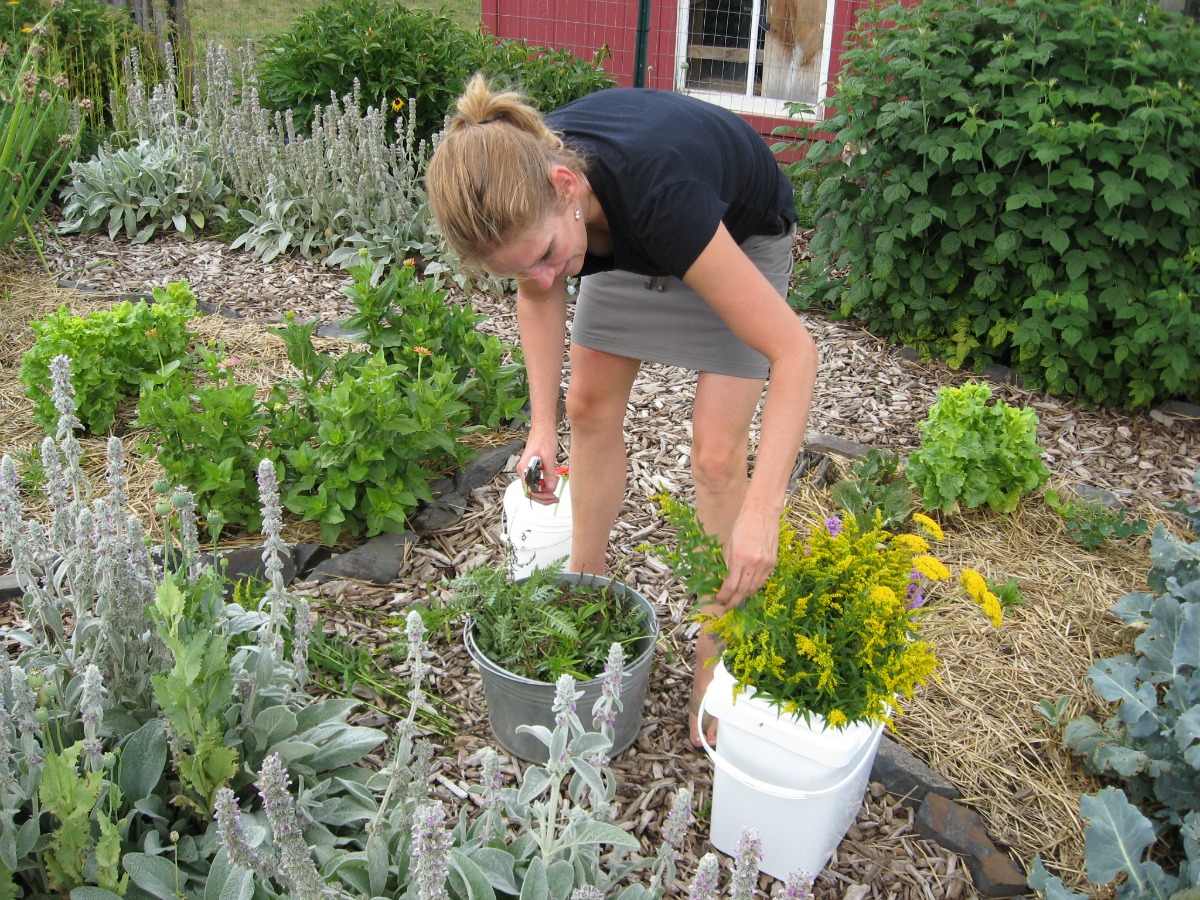
Herbal Academy: Did you have a defining moment when you thought “I’m an herbalist”? What does being an herbalist mean to you?
Carey Denman: My path to becoming an herbalist has been incremental, a process which I liken to stratification. Layer by layer, plant by plant, I’ve built a body of knowledge that has changed how I view the world and how I approach health.
Being an herbalist has empowered me to take back that which I once thought belonged to the powers that be. And it’s woken me up to the world around me—I can’t help but look for herbal allies wherever I go. I always say that there is tremendous power in being able to name things in our world.
What’s more, seeing the power of plants firsthand has confirmed that herbalism can often support us in unique ways . A few years after I started studying and using plants, I hosted a garden workshop where I introduced yarrow and it’s incredible styptic powers. After class, one of the participants mentioned she had an elderly friend who might benefit from yarrow and so took some with her that night to share with him.
The next day, I got a phone call from this elderly gentleman’s wife. She started by asking me to tell her about this “yarrow stuff” and how I had learned about it. She explained that she had been a nurse before her retirement and had never heard of it before.
She explained that her 90-year-old husband had a serious blood disorder known as polycythemia vera. Following some dental work, he had gotten an infection that required IV antibiotics. When the medical staff removed the tape from the IV on his hand, his thin skin tore, and he began to bleed. Due to his advanced age and his condition, the bleeding would not abate. It had continued for three weeks, in fact.
After visiting every doctor in the area, and still unable to get the bleeding to stop, the elderly gentleman and his wife were preparing to leave for the Mayo Clinic, an eight-hour drive from their home. But as it turned out, they did not have to make the long drive after all.
My workshop student had dropped off the yarrow leaves she’d gotten from class, hoping that they might be of help. That night, the gentleman’s wife changed her husband’s wound dressing and bound the yarrow leaves to his hand. Within two hours, the bleeding had completely stopped.
As she recounted all of this to me over the phone, it dawned on me that herbalism had become more than hobby for me. I realized that I had become a catalyst for helping others to embrace the power of herbs. I had become an herbalist.
Herbal Academy: Do you have any tips for someone just starting out being a family herbalist?
Carey Denman: I always tell people interested in learning about herbs to work backwards. It’s easy to be overwhelmed by all the plants out there and all their potential uses. It’s also easy to want to learn it all at once. I’ve hosted workshops where people will bring bags or jars full of herbs they’ve grown or ordered, and have no idea what to do with them. Trying to learn it all once can lead to a kind of paralysis.
Instead, I encourage people interested in learning more about herbs to think of the most annoying or disruptive (non-life threatening) issue that they or someone in their family deals with often. For my family, it was my son’s eczema and recurrent staph infections.
With this in mind, a budding herbalist can explore herbs that may help bring balance to those particular situations, thoroughly researching safety, side effects, contraindications, and age-appropriate uses. I encourage people to choose the gentlest herb available to them and to move slowly, since we are often inclined to throw everything we can as fast as we can at a particular problem. Getting to the source of a problem and finding herbs that are supportive in that instance can take time and patience, but it’s worth the effort. One herbal success builds confidence, which can spur us onto further discoveries.

Herbal Academy: Are there any herbs that you couldn’t do without for your family?
Carey Denman: Since calendula opened the door to my herbal journey, and because it’s been so helpful to my son, it’s a plant that will always remain close to my heart. I make plenty of room for it in the garden and save seeds from one year to the next. I plant those seeds with my gratitude every spring.
Calendula may rule supreme, but there are a number of other herbs that are in regular and heavy use around our home. In fact, because everyone in our family has experienced the wonders of certain plants, even my kids have their go-to herbs. When we were on a recent family trip, for example, and my young daughter got stung by a bee, the whole family sprang into action. No one said a word, but we were all looking for the same thing—plantain! One of the kids found a lone plantain plant at the base of a tree, plucked a leaf from it. Within minutes, my daughter’s pain had dissipated, and she went back to playing on the monkey bars.
In addition to plantain, I’m never without ginger, chamomile, peppermint, or yarrow. I carry all of these herbs with me my purse, in fact. And we’d be hard pressed to make it through cold and flu season without Echinacea and garlic.
Herbal Academy: Many of our students are interested in becoming teachers of herbalism. Can you share any words of wisdom from your experiences teaching classes in your local community? Do you have a favorite style of teaching or one that you find works particularly well?
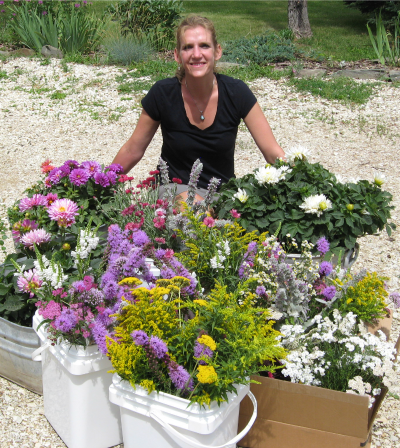 Carey Denman: I maintain that the best way to teach is through what I call the hand-heart-mind connection. I like to introduce plants that are probably already part of my students’ worlds, but that are among those that they may have overlooked. In fact, I champion plants that get consigned to the role of troublesome weeds, such as burdock, plantain, mullein, and comfrey.
Carey Denman: I maintain that the best way to teach is through what I call the hand-heart-mind connection. I like to introduce plants that are probably already part of my students’ worlds, but that are among those that they may have overlooked. In fact, I champion plants that get consigned to the role of troublesome weeds, such as burdock, plantain, mullein, and comfrey.
In addition to introducing familiar plants, I always try to give students an opportunity to see, smell, touch and taste a plant, using their senses as a springboard for learning. Something magical happens when we are able to interact with plants in meaningful ways, so I try to have students make something with the plants I bring. They may strip dried yarrow flowers and leaves from their stems, decant infused oils, stir a salve, or sample plantain pesto.
I see community classes as my opportunity to inspire students, so that they leave ready to take charge of their own path of learning.

